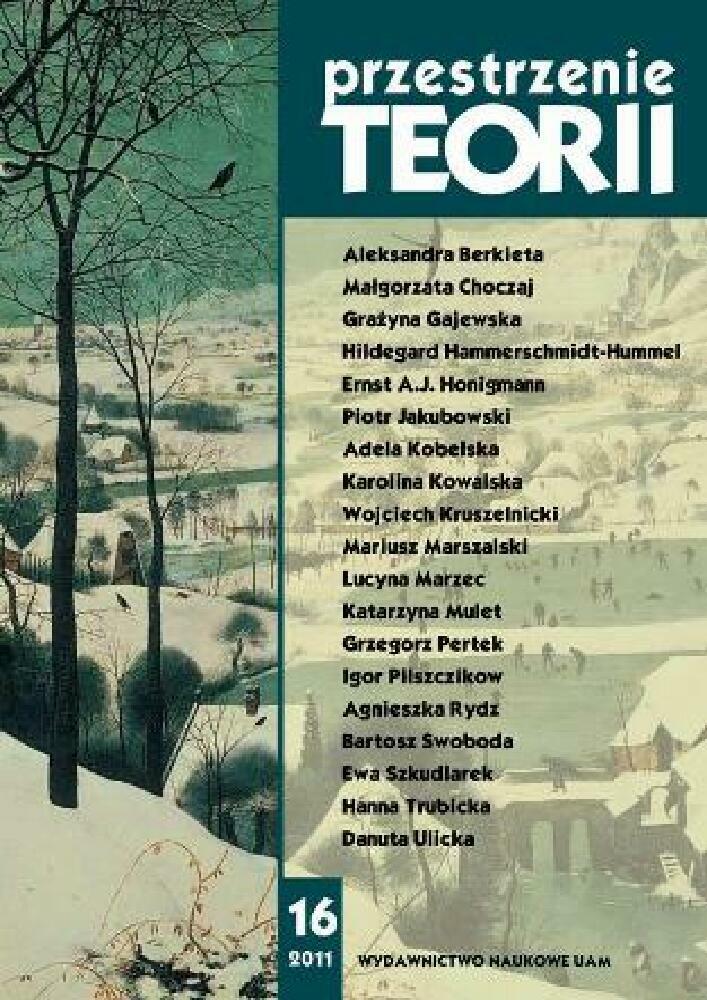Abstrakt
American ecological poetry is a relatively recent literary phenomenon that has marked its existence within the tradition of nature poetry. It is represented by such poets as Robinson Jeffers, Gary Snyder, Archie R. Ammons, Denise Levertov, Mary Oliver and Wendell Berry. The major feature that distinguishes ecopoetry from traditional nature poetry is its distinct biocentrism that is manifested in the attitude of humility towards the world of nature and a critical approach to technological civilization posing danger to Earth’s eco-community. On the level of the ecological consciousness that it promotes, ecopoetry is inspired by such ecosophies as Benedict Spinoza’s monistic pantheism, Aldo Leopold’s earth ethics, Arne Naess’s deep ecology and James Lovelock’s concept of Gaia.Bibliografia
S. Bryson, Introduction, [w:] Ecopoetry. A Critical Introduction, ed. by S. Bryson, Salt Lake City 2002, s. 2, 3-5.
W. Whitman, The Poetry and Prose of Walt Whitman, L. Untermeyer (red.), New York 1949, s. 230-231
W.S. Merwin, The Second Four Books of Poems: The Moving Target, The Lice, The Carrier of Ladders, Writings to an Unfinished Accompaniment, Port Townsend–Washington 1993, s. 86-88.
J. Elder, Imagining the Earth: Poetry and the Vision of Nature, Athens–Georgia 1996, s. 1, 33.
D. Phillips, The Truth of Ecology: Nature, Culture, and Literature in America, New York 2003, s. 155
G. Voros, Notations of the Wild: Ecology in the Poetry of Wallace Stevens, Iowa City 1997, s. 3-7 oraz D. Gilcrest, Greening the Lyre: Environmental Poetics and Ethics, Reno, Nevada 2002, s. 1-3.
W. Stevens, The Snow Man, [w:] The Norton Anthology of American Literature, ed. by N. Baym, Vol. 2, New York 1994, s. 1147, 1248.
W. Berry, A Secular Pilgrimage, [w:] tenże, A Continuous Harmony: Essays Cultural and Agricultural, New York 1970, s. 3-4.
J. Gatta, Making Nature Sacred: Literature, Religion, and Environment in America from the Puritans to the Present, New York 2004, s. 280.
T. Gifford, Green Voices: Understanding Contemporary Nature Poetry, Manchester 1995, s. 3.
L. Scigaj, Sustainable Poetry: Four Ecopoets, Lexington 1999, s. 37.
L. Buell, The Environmental Imagination: Thoreau, Nature Writing, and the Formation of American Culture, Cambridge 1995, s. 7-8.
A. Leopold, A Sand Country Almanac: With Essays on Conservation from the Round River, New York 1966, s. 239. Uwagi dotyczące ekozofii Aldo Leopolda i Arne Naessa przytoczone za moją pracą, Robinson Jeffers’ Poetry – from Deep Experience to Deep Ecology, [w:] Anglica Wratislaviensia, XLVI, Wrocław 2008, s. 25-51.
F. Ferré, Being and Value. Toward a Constructive Postmodern Metaphysics, Albany 1996, s. 298.
A.R. Drengson, An Ecophilosophy Approach, the Deep Ecology Movement, and Diverse Ecosophies, [w:] The Trumpeter: Journal of Ecosophy, Vol. 14, No. 3, [dostęp 23.02.2007].
A. Naess, Spinoza and Ecology, „Philosophia” 1977, 7, s. 45-54.
G. Lloyd, Spinoza’s Environmental Ethics, „Inquiry” 1980, 23, s. 293-311. K.L.F. Houle, Spinoza and Ecology Revisited, „Environmental Ethics” 1997, 19, s. 417-431.
R. Jeffers, Poems, Publisher: PoemHunter.com – The World’s Poetry Archive, 2004, <http://www.poemhunter.com/i/ebooks/pdf/robinson_jeffers_2004_9.pdf> [dostęp 12.06.2011].
G. Snyder, Turtle Island, New York 1974, s. 41.
Online Poems. Modern American Poetry, <http://www.english.illinois.edu/maps/poets/s_z/snyder/onlinepoems.htm> [dostęp 10.06.2011].
W.S. Merwin, „This Absolutely Matters”: An Interview with W.S. Merwin, (wywiad przeprowadzili: Scott Bryson i Tony Brusate), Limestone 1998, s. 1-2.
W.S. Merwin, Rain in the Trees, New York 1992, s. 7.
D. Levertov, Denise Levertov – Poems, Publisher: PoemHunter.com – The World’s Poetry Archive, 2004, <http://www.poemhunter.com/i/ebooks/pdf/denise_levertov_2004_9.pdf> [dostęp 12.06.2011].
M. Oliver, House of Light, Boston 1990, s. 22.
W.S. Merwin, The Vixen, New York 1996, s. 69.
G. Snyder, No Nature: New and Selected Poems, New York 1992, s. 392.
R. Jeffers, The Selected Poetry of Robinson Jeffers, T. Hunt (red.), Stanford 2001, s. 160.
J. Rasula, This Compost: Ecological Imperatives in American Poetry, Athens– Georgia 2002, s. 48-49, 186-187.
P. Shepard, A Post-Historic Primitivism, [w:] The Wilderness Condition: Essays on Environment and Civilization, ed. by M. Oelschleger, Washington 1992, s. 62.
A. Leopold, The River of the Mother of God and Other Essays, S.L. Flader, J. Baird Callicott (red.), Madison 1991, s. 127.
R. Penn Warren, New and Selected Poems, 1923–1985, New York 1985, s. 93.
Licencja
Autorzy
Autorzy tekstów przyjętych do publikacji w czasopiśmie „Przestrzeniach Teorii” są zobowiązani do wypełnienia, podpisania i odesłania na adres redakcji umowy o udzielenie nieodpłatnej licencji do utworów, z zobowiązaniem do udzielania sublicencji CC.
Zgodnie z umową, autorzy tekstów opublikowanych w czasopiśmie „Przestrzeniach Teorii” udzielają Uniwersytetowi im. Adama Mickiewicza w Poznaniu niewyłącznej i nieodpłatnej licencji oraz zezwalą na użycie sublicencji Creative Commons Attribution-NonCommercial-NoDerivatives 4.0 International (CC BY-NC-ND 4.0).
Autorzy zachowują prawa do dalszego, swobodnego rozporządzania utworem.
Autorzy, którzy wykorzystują w swoim tekście cudze utwory (np. ilustracje, fotografie) proszeni są o dostarczenie do redakcji czasopisma zgodę na publikację od uprawnionych podmiotów.
Użytkownicy
Zainteresowani użytkownicy internetu uprawnieni są do korzystania z utworów opublikowanych po 2015 roku „Przestrzeniach Teorii” tylko w calach niekomercyjnych, pod następującymi warunkami:
- uznanie autorstwa - obowiązek podania wraz z rozpowszechnionym utworem, informacji, o autorstwie, tytule, źródle (odnośniki do oryginalnego utworu, DOI) oraz samej licencji;
- bez tworzenia utworów zależnych - utwór musi być zachowany w oryginalnej postaci, nie można bez zgody twórcy rozpowszechniać np. tłumaczeń, opracowań.
Do wszystkich tekstów opublikowanych przed 2015 r. prawa autorskie są zastrzeżone.
Inne
Uniwersytet im. Adama Mickiewicza w Poznaniu zachowuje prawo do czasopisma jako całości (układ, forma graficzna, tytuł, projekt okładki, logo itp.).
